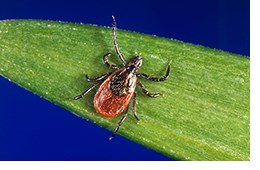THUNDER BAY — The first blacklegged ticks of the season have been turned in at the Thunder Bay District Health Unit, including one that was captured through the "active surveillance" program, the first time that's ever happened.
Ken Deacon, coordinator of the TBDHU's vector-borne disease program, says a local resident found one tick on a trail near the Pigeon River border crossing.
Another blacklegged tick—also known as a deer tick— was what Deacon called "an illegal immigrant," as it was brought in by a local resident who had been travelling in Minnesota.
The third insect, turned in Tuesday, was found by a person visiting the Rabbit Mountain Lookout area off Belrose Road.
Belrose Road was also the area where a fourth tick was collected Tuesday by a summer student working for the health unit on active surveillance, which involves dragging a white sheet along the ground in areas where ticks are likely to be found.
Until now, none of the insects had ever been captured in the Thunder Bay area using this method.
The ticks will all be examined at the National Microbiology Laboratory in Winnipeg to determine whether they are infected with the bacteria that causes Lyme disease.
It takes about six weeks to get test results.
Area residents have also turned in more than 60 wood ticks at the TBDHU. Wood ticks don't transmit Lyme disease, but Deacon said the fact that they are already so prevalent in the area is not a good sign with regard to the blacklegged variety.
In late April, he had suggested that the cold winter and late arrival of spring might help keep this season's tick population down compared with last year, when the bugs made their appearance about two weeks earlier.
"But things are really picking up now, so my prediction about there being fewer ticks than last year may be wrong because we're certainly getting a considerable number of the wood ticks coming in. They are hardier than I could ever have possibly imagined," Deacon said.
Last year, 60 blacklegged ticks were captured in the Thunder Bay district, of which four tested positive for Lyme disease.
The disease is a debilitating illness that is notoriously difficult to diagnose.
The number of cases across Canada has increased tenfold in less than a decade.
